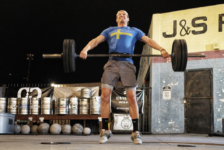
You can create lots of different forces and still move the same barbell. Of course, the force you’re using to move the load must be greater than the load itself or you won’t get it to move, but we often make assumptions that all made lifts are the same. This is untrue.
In fact, lifts that are submaximal come with a whole host of movement options we take for granted. Consider a rarely talked about variable in the gym: velocity. A failure to understand this variable would assume that anyone who takes an empty bar out of the rack and successfully benched pressed in five times has done the same work. When we consider velocity, we realize this couldn’t be further from the truth. An athlete can put 46 lbs of force into the 45 lbs barbell and slowly move it to lock out or an athlete can put 200 lbs of force in the the same empty 45 lbs barbell and lock it out with velocity.
Force production is a powerful driver of performance. There are countless opportunities to use maximal force to move a load as quickly as possible to the lockout versus what most athletes do which is use close to the least amount of force required to successfully lock out the weight. When you’re strength training specifically, consider that your goal ought to be to move the load in question as quickly (and safely) as possible to the lockout.
Logan Gelbrich
@functionalcoach
5/24/19 WOD
Complete 4 rounds for quality:
10 Shoot Throughs
10 Bar Dips
10 Inverted Ring Rows
Then, with a partner complete 3 rounds for time:
Partner A:
250m Row
15 Burpees
Partner B: Rest
-Switch-

